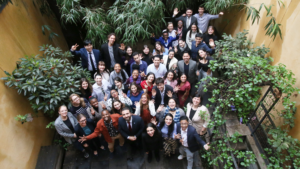
I want to share my experience at the United Nations Headquarters in New York during the 43rd Commission on Population and Development (CPD) entitled ‘Health, Morbidity, Mortality and Development’. As a new staff member for the WYA regional office in Africa, I was very interested in speaking with African delegations to find out their positions on the resolution being negotiated at the meeting. I had the chance to ask many African delegations questions about their statements and to offer my perspective as a young person whose country is impacted by development policies, foreign aid and the decisions being made at this Commission.
While everybody agrees that the objectives of the Millennium Development Goals (MDGs), promoting sustainable and equitable development, are very important and worthy of international commitment, few agree on how to make them a reality. Strangely, some countries and NGOs, mainly from developed countries, seem convinced that “sexual and reproductive health services and rights” are the best way forward to achieve all MDGs.
At one side event I attended, very experienced panellists presented their findings on how much universal access to reproductive health would cost. There were around forty participants in the room and one stood up and asked the following question: How do you ensure that what you advocate for respects the moral values of people in developing countries?
Not surprisingly, the panellist responded that the event was not about ‘moral values’ but ‘financing reproductive health’.
After the event, I congratulated the participant on his excellent question and he responded, “That was the only thing I could do.”
His response reminded me of an article I read in World Youth Alliance training called The Power of Powerless
There seem to be a policy at the UN that fertility reduction is the best way to reduce maternal mortality although this has nothing to offer pregnant women in developing countries the care they need. It seems the most popular idea on the table is that the best way to improve maternal health is to prevent motherhood.
Speaking as a young person from Rwanda I know what is lacking – people need access to basic medical care, doctors and nurses, a clean blood supply and for that matter clean water. Denying these real needs will further make the MDGs unlikely to be achieved. The unfortunate fact is that developing countries are not always able to assert their needs at the UN because donor countries are convinced they have the answers.
Obadias Ndaba (age 24)
Rwanda
Staff in Training







